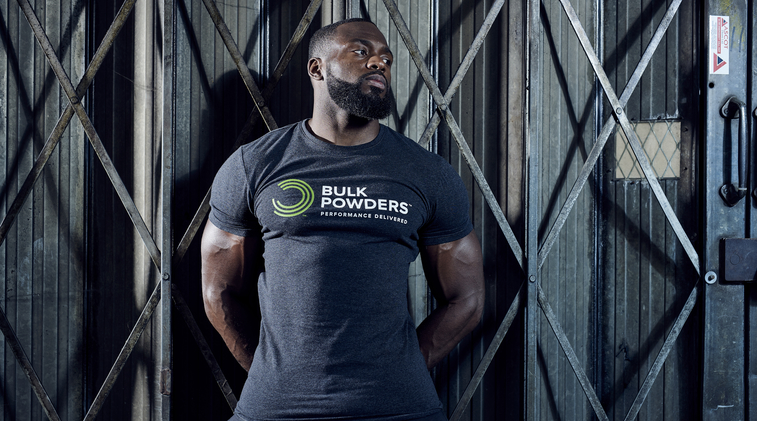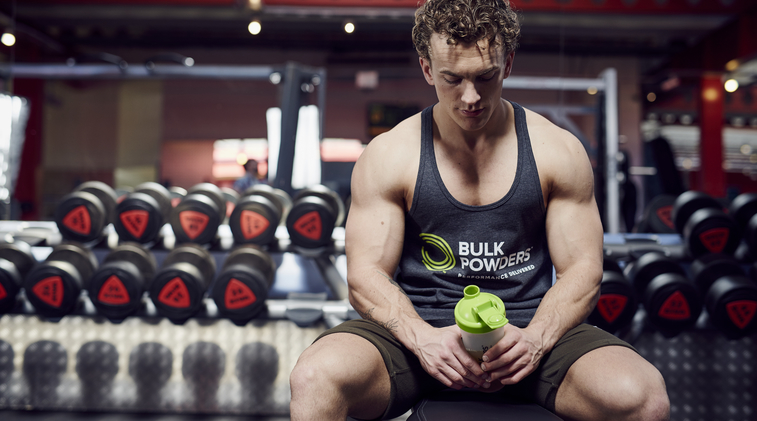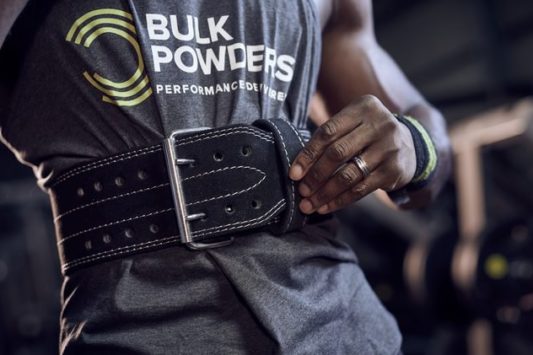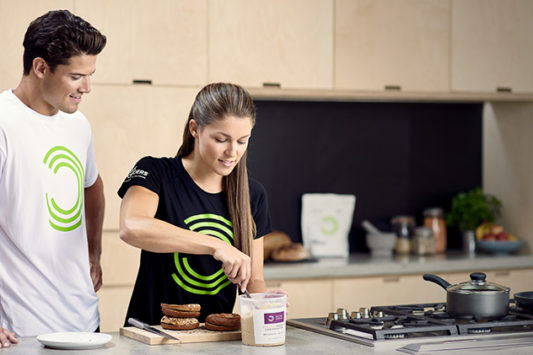When we join the gym for the first time, our primary goal is often to build muscle; the kind of muscle you see in the movies – broad shoulders, thick traps, solid pecs, quads-of-the-gods and not forgetting…guns of fury!
Building muscle can be an uphill battle but there are a number of simple steps you can take to maximise your results – making sure you’re more efficient with your time, in and out of the gym.
The age-old saying ‘you’re only as strong as your weakest link’ rings true, and when it comes to building muscle, there are some big contributing factors such as your diet, training routine, and supplementation, that will directly influence your progress.
Nutrition
When your main goal is to build muscle, it’s important that you’re consuming enough protein in your diet to support the process of muscle growth and recovery. As a general rule of thumb it is recommended to consume about 1.5g – 2g protein per kg of bodyweight for an active individual, but this amount will vary depending on training volume and intensity.
Increased training levels will place your body under increased stress. Eating sufficient amounts of carbohydrates will prepare your body for intense bouts of exercise, as well as helping to refuel your body post workout, when glycogen (energy) levels will be at their lowest. A healthy selection of fats, such as omega 3’s, can also reduce the onset of exercise induced inflammation, and assist in the maintenance of a healthy immune system – an area which can often be affected by frequent training.
But it’s not just what you’re eating; it’s also how much you’re eating. When attempting to build muscle, creating a calorie surplus (consuming more calories than you expend in a given day) is required in order to support extra training activity and the process of protein synthesis.
In summary:
- Make sure you’re eating enough protein.
- Refuel post workout with a mix of protein and carbs to maximise recovery.
- Don’t be afraid of carbohydrates and fats.
Training
One of the biggest mistakes people make when first setting out on ‘mission muscle’ is to spend too much time on isolation moves (exercises like the bicep curl). Whilst these do have their place in a programme, they are much more effective once basic fitness and physique foundations have been developed, but they shouldn’t form the basis of a muscle building routine – at least not at the beginning.
Why not? Simply because isolations aren’t that efficient for all-round muscular development. As the name suggests, they are far too specific to one particular muscle. You’ll get much more bang-for-your-buck by turning your attention to big compound moves like the deadlift, bench press, squat and bent over row or military press – these will stimulate the release of growth hormone in the body which in turn aids the muscle building process.
Find a routine that works for you. Work within a rep range of 8-15 per set and aim for at least 3 sets per exercise. Always aim for the highest rep output within that range – don’t take the easy option. If time is against you, split your training according:
Example training split:
Monday = Chest + Biceps
Tuesday = Back + Triceps
Wednesday = Rest Day
Thursday = Legs + Shoulders
Friday = Core + Arms
Saturday = Rest Day
Sunday = Legs + HIIT
Compound moves are a great way to increase the volume of muscle fibre recruitment because these lifts call upon multiple joints and muscle groups. This in turn places the body under increased stress, generating a greater stimulus – this stimulus is what promotes muscle growth.
Compound lifts are also a fantastic way to strengthen stabilising muscles (and surrounding tendons and ligaments) which assist and protect the main lifting joints and muscles. This stabiliser development goes a long way to preventing injuries, which can have a huge impact on training performance and recovery.
The frequency and volume of your training is also an important consideration. When you first start out, training 3-4 times a week is probably more than enough to stimulate change. Some people struggle to have ‘days off’ or ‘rest days’ (a day where you do little or no training) once they get going, but it’s very important to take some time out to allow your body to recover properly.
It is only during a period of rest that your body and muscles will adapt and grow – overtraining, and not giving yourself rest, is one of the major reasons for slow or stagnated progress – also known as ‘hitting a plateau’.
Listen to your body and adjust your training accordingly.
In summary:
- Focus on big compound lifts.
- Be progressive – muscles need a stimulus to grow so increase load or intensity over time.
- Stick to your training plan – the gains will come.
https://www.youtube.com/watch?v=GMR8A2agvjg&feature=youtu.be
Supplementation
Although we can attain most of the macronutrients we need from our normal diets, there are times when cost and convenience take president. Eating the right foods all the time can be expensive. In addition, food prep and cooking can be time intensive too – whereas a protein shake or supplement is quick and hassle free.
As you start to mirror your nutritional intake with the volume of your training, supplementation soon begins to form a more pivotal role in your progress and development, specifically your ability to generate enough of a calorie surplus to support protein synthesis and exercise recovery. It’s not always easy increasing your calorie intake but supplements are a quick and convenient way to ensure you’re consuming enough protein, carbs and fats in your diet.
Protein for muscles
If you’re building muscle you’ll need to increase your protein intake – or at the very least make sure you are consuming enough. Eating your way through a bunch of chickens is painful work so a supplement like our Pure Whey Protein™ or Pure Whey Isolate™ is ideal for getting the quality protein you need, at an affordable price.
Carbs for growth and recovery
It’s not all about protein though. Carbohydrates play an important part in the muscle building process too, promoting quicker uptake of nutrients to the body as a result of a carb-induced insulin spike. Dextrose and Maltodextrin are both popular fast release carbohydrates and mix well in protein shakes for rapid digestion. Fast release carbs are a great energy source post-workout due to their ability to quickly replenish glycogen stores. Glucose, broken down from carbs, is the body’s preferred energy source. If sufficient levels of glucose are not available, performance can suffer – especially for short-burst, high intensity activity.
Slow release carbohydrates like our Ultra Fine Scottish Oats are perfect as a means of increasing calorie intake throughout the day and will often be used in the morning, evening, or throughout the day, as a sustained source of energy.
Good fats for health and immune system support
Fats are an important part of any diet but are often overlooked or dismissed as being unhealthy. This simple isn’t true – it’s just that some fats are better than options. Steer clear of processed fats (trans fats), the kind you find in sweets, confectionary and ready-made meals. These have no benefits and might promote health issues in the future, like high blood pressure and heart disease.
Good fats like omega 3 have been shown to improve health, reduce inflammation, support joints, affect mood and improve insulin sensitivity. Our Omega Oil Blend is a fantastic product for making sure you’re getting the fats you need, with the addition of Vitamin E to reduce oxidative damage to the oils themselves.
Vitamins & minerals
It’s not uncommon for many of us to be deficient in a variety of vitamins and minerals. Vitamins and minerals are essential for metabolic processes and functions in the body. Without obtaining sufficient vitamins and minerals, these processes can’t function properly. Exercise puts a further demand on our bodies and immune system, so supplementing with something like Complete Multivitamin Complex™, or a nutrient dense supplement like Complete Greens™ will ensure that you’re getting the nutrients you need to ward off illness and fatigue, which is important if you want to maintain your efforts in the gym.
In Summary:
- Support muscle repair and growth with a high quality whey protein.
- Replenish your glycogen levels post-workout to aid recovery with a fast release carbohydrate like Dextrose or Vitargo®.
- Take an omega 3 oil to help reduce exercise-induced inflammation and support joint and immune health.
- Ensure you’re getting enough vitamins and minerals from your diet to fight off fatigue.








